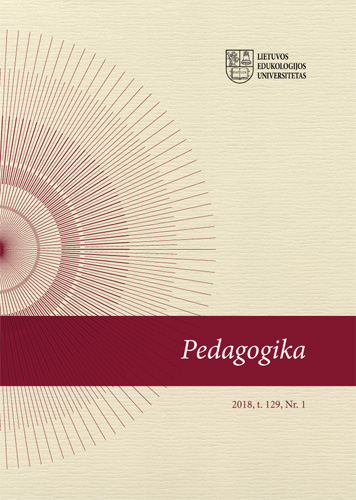Įgalinančio ugdymo raiškos edukacinės įtraukties sąlygomis analizė
Analysis of the Expression of Empowering Education under Conditions of Educational Inclusion
Author(s): Alvyra GalkienėSubject(s): Education, Inclusive Education / Inclusion
Published by: Vytauto Didžiojo Universitetas
Keywords: empowerment; inclusive education; autonomous learning;
Summary/Abstract: In the research, the empowerment strategy application efficiency is analysed in the context of the construct of inclusive education, taking into account that the application of an empowerment strategy in the education process often determines the nature of interpersonal interaction as well. The research question raised: in what manner does the application of empowerment strategy encourage inclusive education processes? The research was carried out by means of qualitative case study strategy. The object of analysis is the socio-educational experience of one class teacher. The data was collected via diary method. In her diary, the teacher reflects on her experiences in the following fields: education design, co-operation experiences, response to pupils’ needs, education process and environment, and curriculum. It was revealed that various activities of pupil empowerment in the education process (setting rules, autonomous formulation of goals, progressive problem solving, information sharing) serve as a basis for the realization of inclusive education and are directly linked to various dimensions of the construct of the given education system. The activation process of inclusive education values benefits from clearly defining the limits to interpersonal actions through systematic reflection on community situations, discussion on pupils’ creative activities, and involving pupils in solving problematic organizational issues within the community. Enabling pupils to continuously participate in solving matters of the learning community allows to avoid the indoctrination of values and creates conditions to internalize the values of community spirit and respect through the recognition of differences between community members as a natural phenomenon. Research results show that the construct of empowering education provides preconditions to involve the pupils into the activities of planning, implementing, and evaluating the education process. Conscious formulation of educational goals in the context of a learning community together with others, as well as taking decisions towards those goals accumulate energy needed to carry out activities and overcome problems, and provide encouragement to plan new, higher, goals. The research reveals that the following two types of empowerment principles are applied in the process of inclusive education: direct empowerment – positive generalizations; information presented openly; providing freedom to decide and accepting the decision; indirect empowerment – demonstrating the teacher’s interest; encouragement; creating conditions to look for solutions; teacher’s contribution to the pupil’s successful result; search for solutions in groups. In order to achieve the realization of inclusive education in schools, it is obligatory to shift from instruction oriented teaching of pupils to trust-based empowerment of the pupils to learn.
Journal: Pedagogika
- Issue Year: 129/2018
- Issue No: 1
- Page Range: 77-93
- Page Count: 17
- Language: Lithuanian

